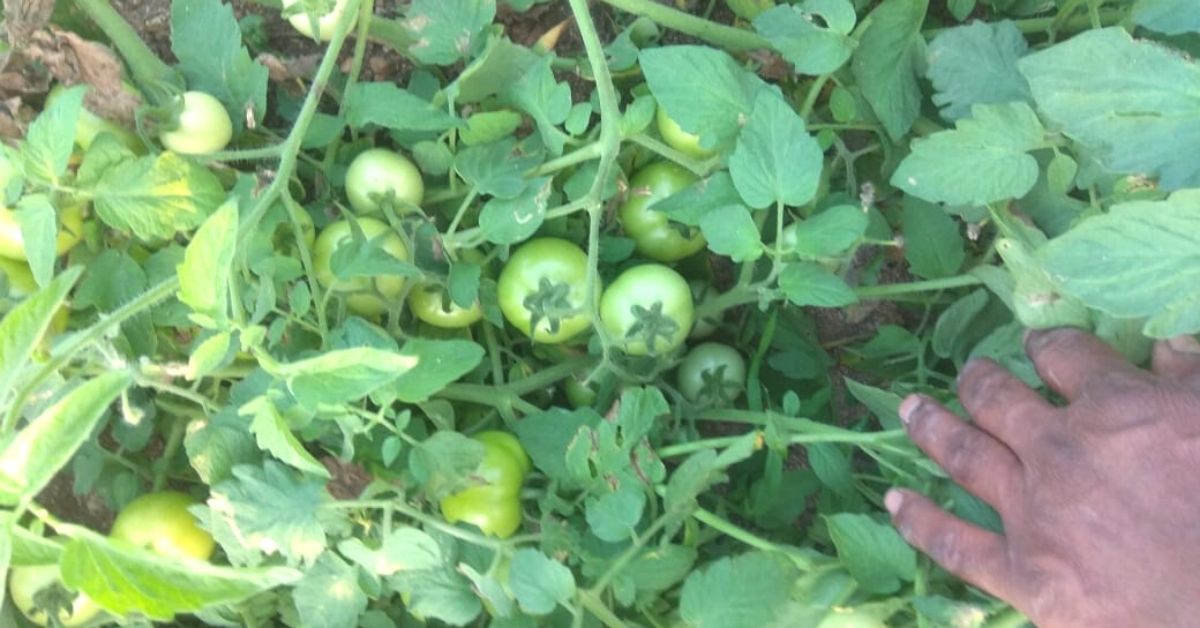Maruthi Naidu’s family, settled in Obulayapalli village in Andhra Pradesh, had been traditional farmers for generations. As Maruthi grew older, he wanted to try his hands at something different, so in 1996, he completed his graduation in arts and tried to land a job as a teacher.
However, his roots came calling when he soon realised that his interest truly lay in agriculture, and so he joined his father on the field. He thus became a third-generation farmer, growing groundnut and sweet lime on his 9-acre farmland.
“My grandfather and father always relied on the two crops for assured income, and mainly used organic manure and compost for farming. We never earned too much, but we never struggled for finances either,” he says.
The 46-year-old says he started farming in 1996 and that at first, he decided to use modern methods of intercropping and chemical fertilisers. “The yield increased in the initial years, but the health of the soil deteriorated. Moreover, I had to take a loan of Rs 5 lakh to buy farm equipment and dig the borewell. Low yield in later years failed to give me a good harvest and affected my income. I failed to repay the loans, and the interest piled up, leaving me burdened with debts,” he adds.

So Maruthi found a way to rectify this damage while earning lakhs. In a conversation with The Better India, he details how.
‘Correcting my path’
In 2012, Maruthi learned about Zero Budget Natural Farming (ZBNF) through a farmer group and decided to attend a workshop.
“The five-day workshop helped me realise the importance of soil health and how poison was entering the food through chemicals. I did not want to ruin the health of my customers,” he says.
So Maruthi returned home and told his family about his decision to change his farming methods. He was met with disagreement.
“My wife was upset and my mother insisted I continue with chemical farming techniques. My younger brother had been using chemical fertilisers and was earning more than me. They refused to allow me to switch to organic methods as they believed this would result in low production for at least a couple of years,” he says.
Finding middle ground, Maruthi decided to continue sweet lime farming through chemical methods, but chose to experiment with natural farming on a small patch of land, on which he grew tomatoes, chillies, watermelon, muskmelon, guava and papaya.
“The produce from this small patch of land gave me good income and better rates. By 2015-16, I went completely natural and earned a surplus. My family now appreciated the success,” Maruthi recalls.

Since then, he has turned his remaining farm into a natural organic farm, earning Rs 18 lakh a year. “I spend about Rs 4 lakh as investments, and the remaining comes as profit. I have repaid my debts and have enough in the bank account to ensure a good education for my children and comfortable life for my family,” he says.
“I grow all seasonal vegetables along with sweet lime and groundnut and sell them in the nearby market and a farmer’s collective, Anantha Naturals,” he says.
Maruthi says he uses all-natural techniques suggested under ZBNF and by Chintala Venkat Reddy, a noted farmer known for his innovative agricultural practices.
“Looking at my success, many farmers from neighbouring areas started visiting and inquiring about the methods I had implemented,” he adds. Today, Maruthi guides farmers from Guntur, Rayalaseema, Kadapa and Telangana.
“I receive queries from about 30 farmers a month, and every year I guide around 200,” Maruthi says.
Explaining the challenges he faced, he adds that he had no experience or help to pursue natural farming methods. “It took me a while, and I reached out to several experts to understand the nitty-gritties of the concept. Moreover, it is easy to visit the market and buy chemical fertilisers. But it is difficult to procure cow dung, green leaves, waste and other ingredients to make organic manure for the crops. It is also labour intensive, and many labourers were unwilling to work for me,” he says.
Maruthi says that preparing the extracts with the required concentration of ingredients was equally demanding. “But I learned over the years and now it has become a routine. Reaching out to retailers helped me get the edge over others and earn better,” he adds.
He says, “The customer is ready to buy the chemical-free produce, and there is a huge demand in the market.”
Watch how Maruthi benefitted by becoming a part of farmer’s collective.
Plan for success
Parathasaradhi Nara, the founder of Anantha Naturals, a farmer producer company, says, “The quality of Maruthi’s farm produce is good, and we pushed to sell it in the market for a higher price to benefit him. Maruthi received help with market networking and crop planning. He is also invited for field workshops to guide farmers through the company,” he adds.
Sharing a tip for farmers wanting to pursue natural farming, Maruthi says, “Planning of crops and execution is crucial in natural farming. Using chemicals for farming is less demanding against natural methods, as the latter involves the preparation of mixes, manure and biopesticides in advance. Sometimes procuring the raw material can become difficult and hence preparation becomes the determining factor for the success.”
He adds that keeping the soil healthy and maintaining its quality is the key to success. “I have learned the hard way, but farmers can take lessons from my experience,” he says.
Edited by Divya Sethu
No comments:
Post a Comment